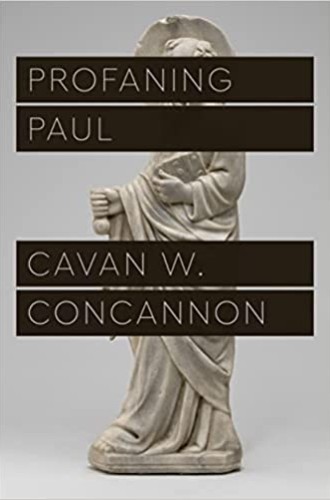Dethroning the canonical Paul
Cavan Concannon believes that the apostle’s writings belong in the latrine.
Paul’s shit stinks, argues Cavan Concannon, so much so that “Paul cannot be redeemed.” Concannon draws the scatological language from Paul himself, noting that Paul frequently flings poo at his opponents. Concannon sustains the imagery throughout his book, which aims to dethrone Paul as a moral and spiritual authority. “If we cannot count the souls in heaven who have benefited from Paul’s theological musings, we also cannot count the bodies that have been left behind.”
A wonderfully vivid writer, Concannon weighs his argument carefully. He does not exactly blame Paul for holding views shared by most of his contemporaries. Instead, he questions why such a person should hold moral authority today. “Why should anyone looking for resources to challenge neoliberal capitalism or the rising current of racist fascism trust the insight of someone who couldn’t see that the forced bondage of human beings was an unconscionable wrong?”
Read our latest issue or browse back issues.
Concannon also cautions that we are talking not about Paul the historical figure but about Paul as canonically constructed, with all the authority that entails. He thereby avoids labored debates about which letters Paul actually authored. He even concedes the possibility that Paul can be redeemed somehow—but not yet, not before we have sifted through the filth to the point of revulsion.
Concannon’s primary objections to Paul will be familiar to many readers, as they are to many of the seminarians I teach. Paul’s writings convey patriarchy, reinforce slavery, and contribute to the oppression of sexual minorities. He can be authoritarian in ways that have served colonizers and despots. One essay option my students face begins with the prompt, “Was Paul a jerk?”
What I want from my students is a sophisticated grappling with this question or some aspect of it. Concannon maintains that a question like mine reflects the countless ways readers—liberal, conservative, inclusive, and doctrinaire—rationalize Paul, as if a little air freshener could remove the stench.
Concannon’s extended investigation of shit is valuable all by itself. We humans remove ourselves from waste, in part as a means of defining civilized space. But we also recycle manure, and waste in general, in ways both productive and exploitative. We need to pay closer attention to our waste, to the significance we attach to it, and to its role in serving people and exploiting them. Concannon’s deep engagement with philosophical and cultural theory has much to teach us, especially when he meditates on what it is like to feel like dung and how our society renounces whole classes of people, notably prisoners, as if they were waste.
Regarding Paul, Concannon’s greatest contribution lies in dismantling attempts to apply lipstick to a turd. Concannon tracks this pattern to the origins of academic biblical scholarship, which sought to strip “pure” ideas and sentiments from historical layers—and in doing so set aside frank engagement with the Bible’s ethical liabilities. The pattern continues as scholars elevate Paul’s critique of empire to explain away Paul’s accommodation of slavery and his clear articulation of misogynist values. Bending our best judgment to accommodate Paul functions no better than our rationalizations of abusive family members and institutions.
Concannon likewise flushes away attempts to reconstruct a radical Paul by means of secular philosophy and other disciplines. He critiques the Pauls set forth by Jacques Ellul, Alain Badiou, Giorgio Agamben, filmmaker Pier Paolo Pasolini, and biblical scholars Ward Blanton and Brian Blount. Both Pasolini and Blount recognize Paul’s potential for harm as well as for liberation, but Concannon argues that redeeming Paul is ultimately impossible. Such efforts may make gold from dung, but never without a malodorous residue. A former evangelical, Concannon has given up the effort. He recommends jettisoning Paul from canonical status: when something stinks, just leave it alone.
Concannon does offer an alternative. Drawing upon African American and queer interpreters, he proposes that we profane Paul, rejecting him as a holy authority but instead engaging him playfully. In so doing, we might find ourselves identifying with both Christ’s self-abasement (Phil. 2:6–11) and Paul’s (Phil. 3:4–11) and find solidarity with one another in our stinky humanity. This is the book’s most elegant part.
Concannon makes use of Black interpreters who reject Paul’s authority but not of others who identify a liberationist legacy. He briefly notes several of the latter group—Allen Dwight Callahan, Emerson Powery, Rodney Sadler, and Lisa Bowens—but never engages their work deeply. I confess that I too am at a loss for how to address these scholars’ divergent readings, which may not be his or mine to adjudicate.
That conflict among interpreters has much to teach us. Concannon well knows that some Christian believers find inspiration and challenge in Paul. He acknowledges that Paul says valuable things, but he says little about what precisely those might be, especially as it relates to healthy theology. Ecumenical Christians will read Paul without limiting ourselves to only two options, the pedestal or the latrine. What about those preachers and scholars who wade into Paul’s sewage yet insist that he also presents gifts we’d be impoverished without?
Christians will continue to read Paul and seek meaning from him. For example, one can make a better case for Paul as a gender egalitarian than for Jesus, yet Paul’s views in this area are deeply, deeply flawed. He claims women have a sexual “use” (that’s the Greek word in Rom. 1:26–27) while men do not. When he warns men against prostitution (1 Cor. 6:10–20), he takes no account of the prostitute’s welfare—and most prostitutes in the ancient world were enslaved. These are deep problems. We don’t talk about them enough.
Yet there is much to learn from Paul, even from his deficiency itself. Many of us value equality and dignity, yet our culture’s dehumanizing scripts keep running in the back of our head, compromising our speech and our behavior. In this respect we can identify with a flawed Paul. It is possible to learn from scripture specifically when things go wrong.
Nor should we overlook the value of some Pauline theologizing. In or out of fashion, my students respond extremely positively to the decades-long “faith in Christ” versus “faith of Christ” conversation. They find spiritual freedom and pastoral value in grounding our salvation in Jesus’ faithfulness rather than in our own mustard-seed faith. Recent scholarship that demonstrates grace as a relational dynamic rather than a simple transaction counters the shallow “all you have to do is receive the gift” gospel. These things matter for Christians, and Paul offers their classic expression.
Concannon focuses on Paul, but his argument just as easily applies to the whole Bible. None of it is pristine. Yet Jews and Christians will find meaning in conflicted texts. Paul often reeks, and Concannon shows us new and deeper ways that is so. There is no point spraying him with perfume. The treasure Paul deposits in clay pots may repulse us. But as any medical lab will attest, excrement can be revelatory, too.
A version of this article appears in the print edition under the title “When Paul stinks.”






